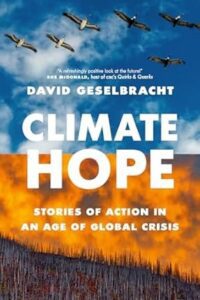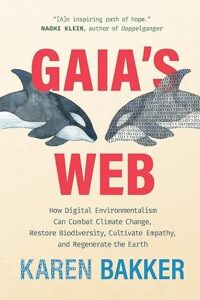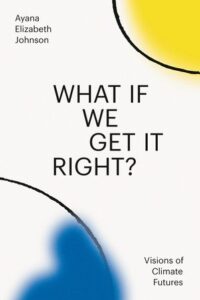Brief Reviews by Ross Thrasher
Climate Hope: Stories of Action in an Age of Global Crisis, by David Geselbracht. Douglas & McIntyre, 2024.
 This is a personal account from a BC-based environmental journalist and lawyer. Geselbracht relates his interviews and travels in search of optimistic strategies working toward net-zero carbon emissions, counteracting the fear and hopelessness experienced by many people as the climate emergency unfolds. Stories of early climate champions are included to provide historical context.
This is a personal account from a BC-based environmental journalist and lawyer. Geselbracht relates his interviews and travels in search of optimistic strategies working toward net-zero carbon emissions, counteracting the fear and hopelessness experienced by many people as the climate emergency unfolds. Stories of early climate champions are included to provide historical context.
The Scandinavian countries offer a smorgasbord of decarbonizing solutions. Norway has gone all-in on electric vehicles, Sweden has invested in nuclear energy, while Denmark’s primary clean-tech option is wind power. In Norway, “an array of aggressive incentives, along with excellent charging infrastructure, have helped the Norwegian EV increase” to 82% of new vehicles sold in the country in 2023. Sweden’s power grid is almost fossil-free, thanks to its commitment to nuclear reactors 50 years ago in the wake of the OPEC oil crisis. During a visit to a Swedish nuclear plant, the author is impressed with the safety and waste-storage measures explained and demonstrated. The chapter entitled Nordic Net Zero outlines Denmark’s emphasis on wind turbines, taking advantage of the gales off the Atlantic Ocean and the Baltic Sea. Also, Copenhagen generates a quarter of its electricity by burning waste and biomass instead of coal or gas. “Copenhagen’s ambitious goal to be net-zero by 2025 … is the most ambitious target of any city in the world”, and while that date won’t be met, CO2 emissions in that city have been reduced by 72.5% in the past two decades.
Geselbracht devotes other chapters to diverse topics like managing wildfires, seeking legal recourse from corporate climate villains, attending a COP conference, and the environmental efforts of Christian evangelicals. Climate Hope contains a wealth of accessible and promising information, presented informally.
Gaia’s Web: How Digital Environmentalism Can Combat Climate Change, Restore Biodiversity, Cultivate Empathy, and Regenerate the Earth, by Karen Bakker. MIT Press, 2024.
 This book describes “the digital networks used to monitor Earth, its ecosystems, and its inhabitants for environmental management and conservation purposes”. The author was a Canadian professor at UBC and Harvard who passed away prematurely in 2023. Naming the Greek goddess of the Earth in the title invokes “the fusion of the World Wide Web and the Web of Life”.
This book describes “the digital networks used to monitor Earth, its ecosystems, and its inhabitants for environmental management and conservation purposes”. The author was a Canadian professor at UBC and Harvard who passed away prematurely in 2023. Naming the Greek goddess of the Earth in the title invokes “the fusion of the World Wide Web and the Web of Life”.
Drones, satellites, motion sensors, chip implants and other devices have facilitated computerized monitoring techniques. Gaia’s Web contains some fascinating stories about digital inventors, like a Moroccan biologist who developed surveillance technology to identify illegal fishing operations. And a computer scientist who created StripeSpotter, a “barcoding” system for zebras, that was then modified and scaled up using facial recognition and other distinctive features to track many wildlife species and deter illegal poaching.
Digital Earth technologies are also useful in the climate-change arena — locating and measuring emissions of methane and other pollutants; monitoring wildfire hazards in the forest; optimizing energy usage in buildings and supply chains. But Bakker warns us that our digital ecosystems, especially AI applications, are themselves energy-intensive. Can we decouple green growth from excess consumption?
Gaia’s Web is an important book that asks probing questions and offers a cautiously optimistic way forward.
What If We Get It Right? Visions of Climate Futures, by Ayana Elizabeth Johnson. One World, 2024.
 Dr. Johnson, an American marine biologist, is the co-creator of the Urban Ocean Lab and the Blue New Deal, “a roadmap for including the ocean in climate policy”. This book addresses broader aspects of the climate crisis and strategies for changing the trajectory. The text consists largely of interviews with a score of climate champions, interspersed with poems, lists of problems and possibilities, even a musical mixtape at the end. It’s an engaging potpourri with a positive focus.
Dr. Johnson, an American marine biologist, is the co-creator of the Urban Ocean Lab and the Blue New Deal, “a roadmap for including the ocean in climate policy”. This book addresses broader aspects of the climate crisis and strategies for changing the trajectory. The text consists largely of interviews with a score of climate champions, interspersed with poems, lists of problems and possibilities, even a musical mixtape at the end. It’s an engaging potpourri with a positive focus.
The contributors include well-known figures like the writer Bill McKibben and the film director Adam McKay; plus academics, activists, agrarians, architects, artists and attorneys. The subject matter in the interviews ranges from regenerative farming to the international banking system to the role of the arts and culture in raising awareness. By presenting oodles of statistical and other scientific data in a conversational format, Dr. Johnson and her interlocutors render them more digestible. They also convey their love of nature and their commitment to its preservation.
What If We Get It Right comes highly recommended for its encyclopedic coverage of climate-change issues and potential solutions through many enlightened voices.
Ross Thrasher
Ross has enjoyed a 30-year career as a librarian at post-secondary institutions in Canada, the U.C. and the South Pacific. Most recently he served for eight years as Library Director at Mount Royal College in Calgary, leading the library’s transition to university status. In retirement Ross maintains an active interest in literature, travel and the performing arts.
Feature Photo Credit
Su Schnee’s art name is suschnee. She grew up, and attended art school in Vancouver, B.C. Su co-founded Oboro, an artist centre in Montreal, where she was Artistic Director for more than 30 years. She currently lives and works in Vancouver.
suschnee.ca
Read more book reviews in GTEC’s Communications & Media section here.

